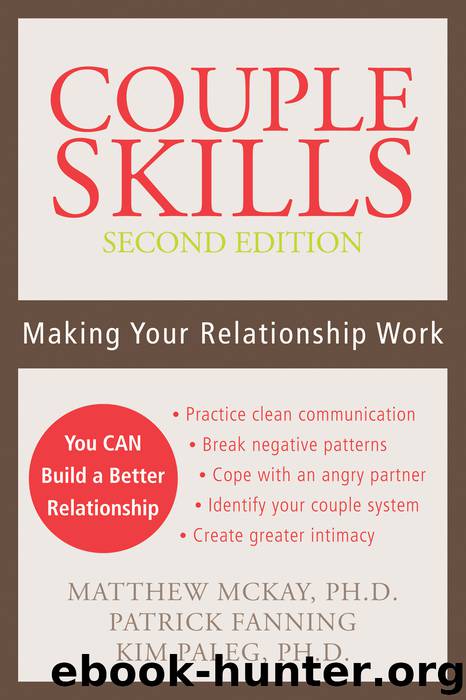Couple Skills by Matthew McKay

Author:Matthew McKay [McKay, Matthew]
Language: eng
Format: epub
Tags: PSYCHOLOGY / Interpersonal Relations, FAMILY & RELATIONSHIPS / Marriage
ISBN: 9781608824199
Publisher: New Harbinger Publications
Published: 2011-01-01T05:00:00+00:00
Assertive delay. Rather than being compelled to respond instantly to criticism, assertive delay allows you to take a break. Whether for a few seconds or several hours, a time-out lets you calm down, think carefully about what’s being said, activate some coping strategies, and prepare your response. “You’ve said a lot, and I need time to digest it. Let’s talk again after lunch.” “Wait a second, and let me think about that.” “Slow down; I really want to understand everything you’re saying.” “I’d like to give you an honest answer, but it’s going to take some time. I’ll call you tonight.” Refusing to respond under attack can prevent an angry escalation. You don’t need to apologize or explain—just postpone.
Clouding. Clouding involves finding the grain of truth in the criticism while holding on to your own assessment of the situation. It requires careful listening to find the piece of the criticism with which you can honestly agree. There are three ways of agreeing with your critic. Agreeing in part involves acknowledging the part of the criticism that you agree with while ignoring the rest. Without losing the essence of the criticism, you can modify gross overgeneralizations such as never or always. Partner: This place is a pigsty! And you don’t give a damn what it looks like, do you?
You: You’re right, the house is a mess.
Partner: Your fees are way too low. I can’t believe you’re so financially irresponsible.
You: Yes, my fees are low.
Agreeing in probability acknowledges that there might be a chance—however minute—that the criticism is accurate. In the previous examples, your responses might be: “It’s possible that I don’t care enough about keeping the house clean” and “You might be right that my fees are too low.”
Agreeing in principle means that you acknowledge that if the condition your partner describes exists, then the conclusion that he or she made is likely. But you neither confirm nor deny that the condition exists.
Partner: If you don’t work harder, you’re never going to get a raise.
You: It’s true, you have to work hard to get a raise.
Partner: If you don’t spend more time with Jenny, you’ll never have a good relationship with her.
You: You’re right. If I don’t spend time with Jenny, I won’t have a good relationship with her.
Notice that in neither case are you agreeing with the premise that you aren’t working hard enough or that you’re not spending enough time with Jenny.
Download
This site does not store any files on its server. We only index and link to content provided by other sites. Please contact the content providers to delete copyright contents if any and email us, we'll remove relevant links or contents immediately.
The 5 Love Languages: The Secret to Love That Lasts by Gary Chapman(9782)
Doing It: Let's Talk About Sex... by Hannah Witton(9275)
Should I Stay or Should I Go? by Ramani Durvasula(7652)
The Road Less Traveled by M. Scott Peck(7592)
The Lost Art of Listening by Michael P. Nichols(7487)
Daring Greatly by Brene Brown(6501)
Beartown by Fredrik Backman(5734)
We Need to Talk by Celeste Headlee(5608)
Men In Love by Nancy Friday(5231)
The Rules Do Not Apply by Ariel Levy(4956)
The State of Affairs by Esther Perel(4710)
How To Win Friends and Influence People by Dale Carnegie(4496)
Reflections Of A Man by Mr. Amari Soul(4287)
Pillow Thoughts by Courtney Peppernell(4271)
The Ethical Slut by Janet W. Hardy(4241)
Algedonic by r.h. Sin(4056)
Surrounded by Idiots by Thomas Erikson(4024)
He's Just Not That Into You by Greg Behrendt & Liz Tuccillo(3889)
I Love You But I Don't Trust You by Mira Kirshenbaum(3859)
